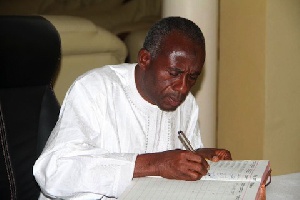Ghana can now boast of a comprehensive National Housing Policy that would serve as a guide to the activities of all State and non-state actors in the housing sector.
The Policy, which was launched by Alhaji Collins Dauda, the Out-going Minister of Water Resources, Works and Housing, in Accra, on Friday, has a goal of providing adequate, decent and affordable housing that is accessible and meet the needs of all the people living in Ghana.
The Policy would also ensure that housing is designed and built to sustainable building principles, leading to the creation of green communities, ensuring full participation of all stakeholders in decision-making on housing development and allocation in their communities, and ensuring adequate and sustainable funding for the supply of diverse mix of housing in all localities.
According to Alhaji Dauda, Housing as a social good, provided core security for families, neighborhoods, societies and communities, and had an equally economic quality to stimulating growth and development.
Rapid population growth and, in particular, increasing urbanization, had made shelter one of the most critical challenges currently facing the country, he said.
However, he noted, “Ghana’s housing deficit is estimated to be in excess of 1.7 million units and to be able to clear this deficit and accommodate new households, we require a minimum annual delivery of about 170,000 units for the next 10 years”.
Consequently, Alhaji Dauda said the major contribution of the private informal sector to the growth of the housing sector was greatly acknowledged, therefore, the policy sought to create an enabling environment for the private sector to continue to provide leadership in the delivery of houses.
The Policy, he said, had laudable initiatives in respect of improved access to land with good title for housing and outlined policies for increased production and usage of local building materials in construction.
It also recommended the establishment of a National Housing Fund, which would be used for affordable mortgages, construction finance, slum upgrading and support for small scale local building material producers, he said.
He said the establishment of a National Housing Authority had also been recommended, to oversee to the implementation of the Policy.
He expressed the Ministry’s gratitude to all stakeholders and partners who were actively engaged in the development of the Policy and for pledging their continuous support towards the preparation of the Housing Strategy.
Ms Abena Ntori, a Representative of the UN-Habitat, said the launch of the Policy was timely at a period where sustainable housing was just yet to gain prominence in Ghana, while decent and safe housing remained a dream for the majority of the population, especially the urban poor.
She said the need to construct more housing units had become more critical because the phenomenon of climate change had come to stay, given that the housing sector alone was responsible for nearly 40 per cent of greenhouse gas emissions in cities.
She said a better housing and slum upgrading would, therefore, contribute to reducing social inequalities and improving urban safety and quality of life, through their socio-economic and spatial impacts.
General News of Sunday, 29 March 2015
Source: GNA

















